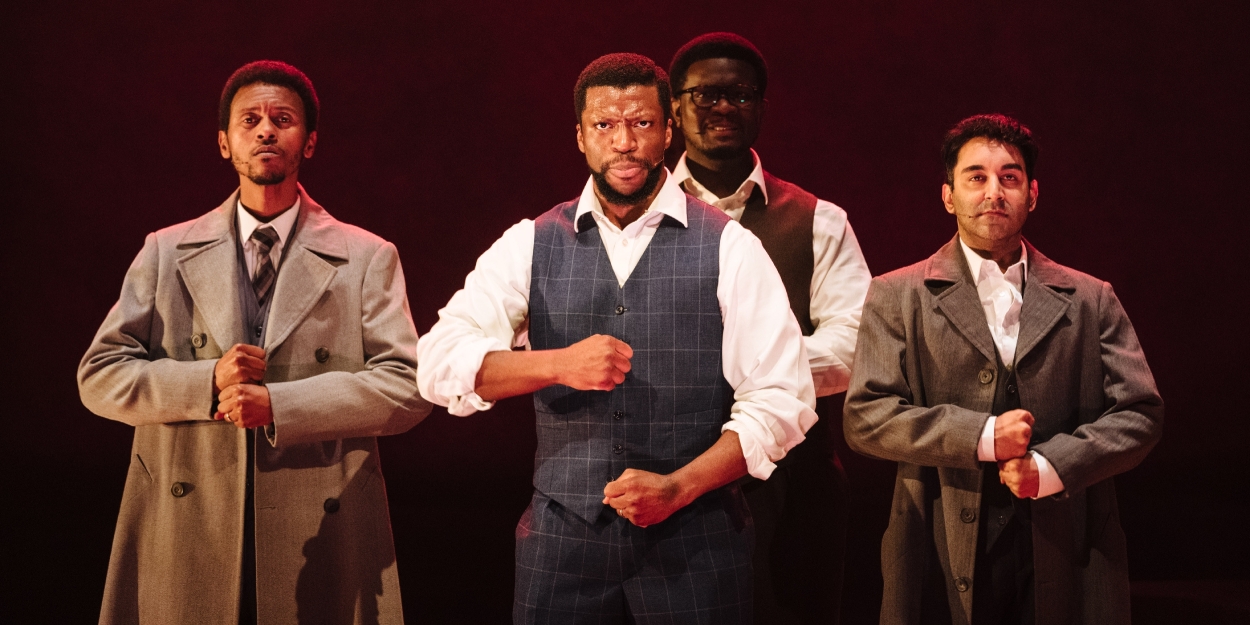Review: MANDELA, The Young Vic
Is this new musical the Young Vic's next big West End transfer?

![]() To paraphrase Henry Wadsworth Longfellow, when Mandela is good, it's very, very good, and when it's bad, it's almost unwatchable.
To paraphrase Henry Wadsworth Longfellow, when Mandela is good, it's very, very good, and when it's bad, it's almost unwatchable.
Powered by strident performances from Michael Luwoye in the title role and Danielle Fiamanya as his wife Winne and produced with the "proud partnership" of the iconic figure's family, the Young Vic and its artistic director Kwame Kwei-Armah have pulled off something of a coup to get the world premiere of this musical. The Young Vic have already scored a major success this year with the West End transfer of Best Of Enemies - will Mandela follow in its footsteps?
The title is taken very seriously: the politics and history are all present and correct but this is above all a very personal take on the man known to his followers as Madiba, a Xhosa term of affection derived from his clan name. We first meet him just before the Sharpeville massacre when police fired on a non-violent protest against the latest segregation laws; when the dust cleared, 249 people (including 29 children) had been shot and 69 of those killed.
We then see him go from a freedom fighter blowing up military installations to his capture and imprisonment in Robben Island. At each step, the songs and script underscore the effects on Mandela's humanity: how he strived in the bombings to avoid human casualties, how he left his family behind to protect them and the inhuman treatment in prison where non-Blacks got to wear trousers and ate toast while Blacks were given shorts and only maize to eat.
This sounds like grim stuff but the light-touch book (Laiona Michelle) and songs from South African-born Greg Dean Borowsky and Shaun Borowsky keep the mood as upbeat as possible. The first couple of numbers are turned up to eleven and great use is made of African rhythms, dance and language to set the scene. Even with a largely bare stage, we immediately have a sense of where we are. In particular, Fiamanya digs deep into her soul to pull out the anguish and grief of the wife left to fend for herself on the outside.
Throughout, Luwoye does an astounding job as Mandela, the American actor getting the freedom fighter's familiar African accent and halting cadence down to a T. With the exception of his close family members, other characters are thinly drawn or, in the case of the various Prime Ministers or wardens who served while Mandela was imprisoned, merged into one. Stewart Clarke's Warden is the arguably the only character with an arc, going from strict disciplinarian to, by the end, inviting Nelson over for dinner with his family. Earl Carpenter makes for a deliciously evil Prime Minister with so much stern gravitas that we expected Star Wars' "Imperial March" to be played every time he appeared.
By starting the musical in 1960, the writers skip over Mandela's early life including his 14-year-long marriage to and divorce from Evelyn Ntoko Mase with whom he had four children, his ANC activities since 1943 or (until a change of mind sometime after 1951) his resistance to a multi-racial solution to South Africa's problems; similarly no mention is made of his Christian faith or his Communist leanings.
Instead, we are presented from the off with an attorney who seeks to make his country a place fit for both black and white citizens in the name of democracy and a secular saint who, for the sake of Winnie and the children, is drawn into a political life and his role in history.
True, there are some dark scenes, not least when Mandela learns of his son's death and his second-half confrontation with a Lady Macbeth-like Winnie. Sadly, by the end, the dramatic heft of this musical is washed away through the kind of all-cast dance number more suited to light-hearted comedies than political biographies; not even the much-derided Star Wars Christmas Special had Darth Vader throwing jazz hands as the curtain came down.
Ultimately, though, it's the numbers from the brothers Borowsky that make this production what it is, for better and worse. There are some phenomenally powerful songs, not least the title tune and "Fight Fire With Fire", many of which are West End-ready. Having the story largely sung-through with songs of this calibre makes things flow but we can see American audiences hankering for more exposition. There are, though, occasions when the melodies are too melodramatic and we're sheep-dipped in sentimentality. This might make Mandela a more palatable option for bigger venues but, as we've seen with other political shows like Best of Enemies and Hamilton, audiences don't need extra helpings of shameless tear-jerking to appreciate the underlying story.
Mandela continues at the Young Vic until 4 February 2023.
Photo Credit: Helen Murray
Reader Reviews

Videos

